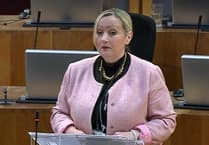Concerns have been raised about access to hearing services, with statistics showing the number of people on waiting lists for a hearing aid has ballooned by 150% in three years.
Janet Finch-Saunders told the Senedd that 527,100 adults – 17% of Wales’ population – have a degree of hearing loss that would benefit from treatment such as hearing aids.
She said that 4,000 people were waiting for a hearing aid appointment three years ago but by September 2023 that number had reached nearly 10,000.
Highlighting that Wales has the highest proportion of over-65s of any UK nation, she told the chamber it is imperative to develop the best hearing services possible.
She explained that incidence increases by about 1% per year of age, so 80% of 80-year-olds and 90% of 90-year-olds will have hearing loss.
The Aberconwy MS raised concerns about a “postcode lottery” in terms of waiting times.
She said only one patient waited longer than 14 weeks in Swansea, 583 in Hywel Dda and a staggering 1,674 in the Betsi Cadwaladr University Health Board area.
Ms Finch-Saunders pointed out there is also an inconsistent spread of audiologists employed by health boards with five in Powys and 65 in Betsi Cadwaladr.
‘Dissatisfied’
Calling for greater collaboration with independent providers such as Boots and Specsavers, she argued it would help health boards add capacity and improve access.
She said the model, which is in use in England and Ireland, has provided services at a third of the per-patient cost compared to hospital services.
Ms Finch-Saunders highlighted that the National Deaf Children’s Society (NDCS) found that 26% of families were dissatisfied with waiting times for paediatric audiology.
She told MSs: “Health needs to work with education, which has seen a 17% reduction in teachers of the deaf in Wales since 2011.”
Ms Finch-Saunders added that NDCS has found that some children are being denied individual development plans under Wales’ new additional learning needs system.
‘Stigma’
She warned: “Hearing loss cuts people off from each other. This can increase the risk of social isolation, cognitive decline and other mental issues.
“And I'm given to understand that it can actually bring on early dementia and Alzheimer's.
“Too often, deaf people who simply cannot hear quite often feel that they are referred to as 'daft' people – and that's the stigma that we've got to get rid of.”
Mark Isherwood, who lost his hearing as a younger person, urged ministers to recognise that demand for audiology services is only going to increase.
He echoed calls for the NHS to work with community audiology service providers.
Natasha Asghar, a fellow Conservative, who represents South Wales East, highlighted a Senedd event on adult age-related hearing loss that she sponsored on Tuesday.
‘Discrimination’
Joel James, who spoke about his own experiences of hearing loss at the event, said hearing impairment is linked to cognitive decline but when aids are fitted, it ceases immediately.
He said: “If we look at child development, we know of social isolation, the impact in terms of speech and language, and then also the social skills that can be impaired.
“And then if we look at when we become adults, in terms of the working environment, there are 4.4 million in the entire UK that have hearing difficulties.
“Many of them feel that they're being discriminated against in the working environment.”
Russell George, the Conservatives’ shadow health minister, emphasised the need for early intervention and diagnosis, saying it can bring a saving down the line.
‘Devastating’
Responding to the short debate on February 7, Eluned Morgan recognised that hearing loss can be devastating at any age and can leave people feeling isolated.
The health minister said audiology services are delivered differently from the rest of the UK, arguing there is a stronger emphasis on primary and community care than elsewhere.
Baroness Morgan said she does not have any principled objection to exploring private sector options but the Welsh Government will prioritise public sector provision.
“If they can't do it, then, obviously, let's look at alternatives,” she told the chamber.
“But I would like to give this a fair wind, and I guess the health boards are on notice that they've got to deliver on what we're asking them to deliver.”
She added: “Let's stick to the plan, and, if they don't deliver, then there'll be ructions.”




